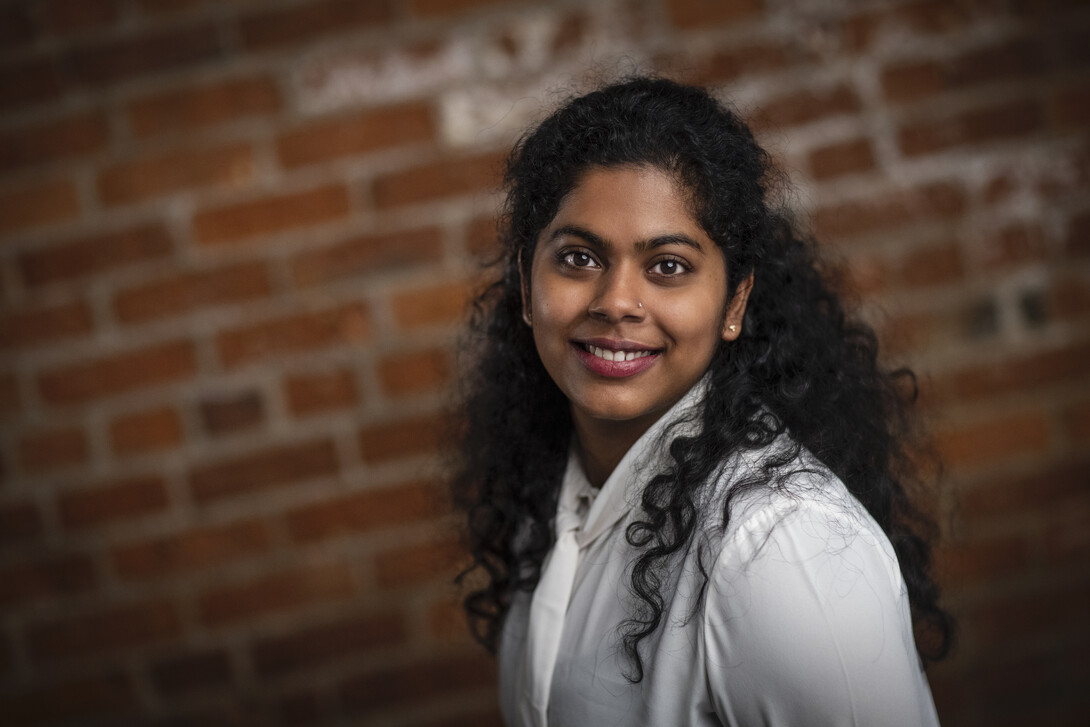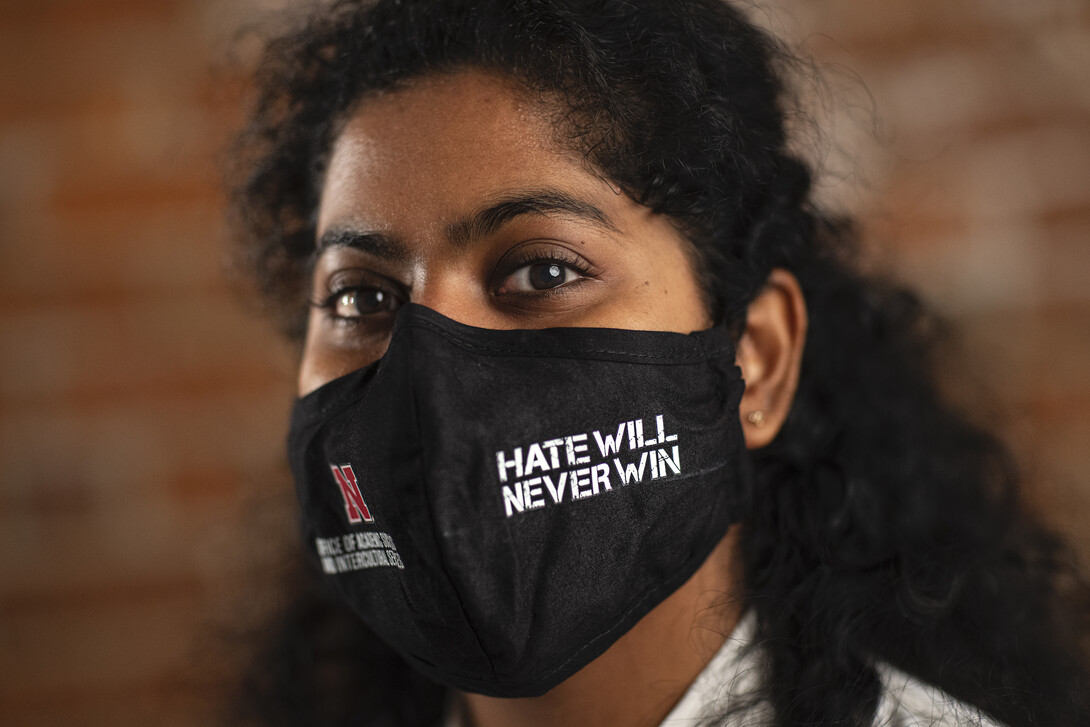
When Jessie Peter arrived at the University of Nebraska–Lincoln in 2016 as a doctoral student in Child, Youth and Family Studies, she had already launched a career in school counseling, but realized she wanted to learn more in order to do more.
Now, as a doctoral student and graduate assistant in the Office of Diversity and Inclusion, Peter is learning by doing — either through research on the ground in her native India or by bringing stakeholders together to increase diversity on campus — and making an impact.
Recently, Peter sat down with Nebraska Today for a conversation on bringing about positive change, how her past work as a counselor shaped her current path, and the importance of teamwork.

How did you find yourself at the University of Nebraska–Lincoln?
The first thing was the program. I really liked the specialization of Global Family Health and Well-being that the Department of Child, Youth and Family Studies has, because it was directly in my interests in to study families, and to do that research. It was a perfect fit.
The second thing was the people. When I was in the Skype interview, there was Dr. Yan Ruth Xia, Dr. Cody Hollist, Dr. Maria De Guzman, and they listened to what I wanted to do with this program, with the Ph.D. They advised me accordingly, so I felt like they were recognizing my talents, and they knew what work I had to do. They were ready to help me get started, and that was helpful. Third and the best part was the combination of the two, though the program was rigorous, it also had flexibility to be shaped, based on what I was interested in. Also, students are encouraged to get diverse experiences that prepares them for academic and non-academic career paths, which I thought was amazing.
You were previously a school counselor in India. How did that lead you to pursue a doctorate?
In India, typically the schools have kindergarten through 12th grade, on one campus. As a school counsellor, I had several responsibilities: (1) My role was to teach a life skills course for middle and high school students, which included topics like self-awareness, gender, stereotypes, things like that. (2) To conduct counseling sessions for students and teachers on campus. (3) To collaborate with the Special Education team to create an inclusive environment so that we could become an inclusive school. A typical day was about teaching, conducting counseling sessions, and looking over policies to make the school more inclusive. While I was doing this, I realized that I cannot do this on my own. I needed to work with so many other people and develop my expertise to bring about this change. That pushed me to apply for the Ph.D. program.

How did that background prepare you for your work in the Office of Diversity and Inclusion?
It has prepared me quite a bit. I think in the beginning, I did not recognize it, but I see it now. Especially, for instance, there was this case where a student needed accommodations for his special needs. I worked with his parents, the principal, the teachers, and whoever was going to his class. Then I also had to work with a special education team. This helped me understand that to bring about change in an educational institution, you cannot work alone. And that’s exactly how we work in ODI. We work as a team. We work with the institution and with the community, and we are trying to bring that change.
Can you walk us through some of your work in ODI?
I have been with the ODI from the beginning. In the first year, I worked with Dr. Barker on The first 150-day report; with Dr. Friday, and Jerri, I worked on the MLK event, the State of Diversity event, created ODI social media presence and managed the ODI website. In the second year, my focus moved to education. Currently, I work with Dr. Karen Kassebaum, to create and maintain diversity education opportunities for our campus and for the community.
One of the main initiatives that we’ve done together is NCLUDE. That is the Nebraska Community of Learners Understanding Diversity through Education. It is amazing because it gives a platform where people who are experts on a topic can come tell us about evidence-based research, or about practices that are helpful to improve diversity and inclusion within the community and campus.
What is the biggest challenge facing UNL in the realm of diversity and inclusion?
In the limited experience that I have, I would say that it is more about bringing everyone together, because a lot of initiatives are already in place. They are probably happening in different colleges and offices that not everybody knows about and can take advantage of. One of the things we need to do is to centralize those initiatives, so that everybody has equal access to it, and maybe go to one place where you can find all the resources available on and off campus. I think that would be helpful.
Who impacted or inspired you to pursue your education and career?
I think there have been quite a few people. My first inspiration is my grandmother. She has had no education, but she has been very persistent in whatever she does. Her resilience and the way she has fought through her life struggles inspired me to keep pushing.
Then I would also say my primary school science teacher, Christy maam who was amazing. I went to school in the Middle East in Abu Dhabi. At the time, I did not know English, and I only spoke Tamil. She would take me everywhere with her just to make sure that I was understanding and learning. The way she made me feel at school made me want to do that for somebody else.
Here, Dr. Kassebaum is an insightful mentor who has impacted my professional experiences at UNL and career choices. Dr. Dalla inspires me to make consistent efforts, to keep pushing myself a little more every day, which lays the foundation to become a good social researcher. As experienced scholars in academia, they have shown that through persistent efforts, change can happen.
In terms of pursuing your doctorate, what is the focus of your research?
I have a master’s in counseling psychology, and I volunteered in a few places in India before I came here. That helped me adjust to the doctorate program. When I came here, I joined the Human Trafficking and Vulnerable Populations Research Lab, led by Dr. Rochelle Dalla. That was key in helping me decide what my research focus would be. One of the initial projects I was involved in was to try to identify the prevalence of human trafficking in Nebraska. Then I got the opportunity to do a study abroad with a focus on human trafficking in India, and I got to see what Non-Government Organizations are working on to improve living conditions of women in the street-level sex industry in India. It bothered me and moved me so much that I wanted to go back and do something about it, and Dr. Dalla was supportive. Now, my research focuses on exploring families of marginalized women in the commercial sex industry in India.
How have you managed your work and life balance during a pandemic that has us working from home quite a bit?
It’s been challenging. It’s been rough, but I think I’ve done a few tiny things in an attempt to strike that balance. One of the things is just getting ready and dressing up as I usually do for work. I think that helps me be in a better mood and helps me be more productive. The other thing is, I usually use a weekly planner, and now I’ve just made it more elaborate. My time is more accounted for. With increased screen time, I find my eyes tired by noon, so I try to have about 15-minute breaks between zoom meetings, which helps me refresh.
I also love Lincoln trails, and when the weather is good, I am out biking or walking. I enjoy my walks around East Campus, which usually end with ice cream from the Dairy store.
I’m going to ask you to speculate from your perspective and expertise. Where will schools and education in general go from here?
The education system is constantly evolving. Recent incidents and COVID-19 have acted as a catalyst to fasten some changes. It changes the way we are doing things. With learning, it is preparing us to be more online based, inclusive, and understanding. Education can change a person’s life trajectory. Therefore, it is crucial now more than ever that people have equitable access to it. For eg; As a first generation graduate student, I have infinite opportunities to excel compared to my grandmother or mother who did not have similar chances.







